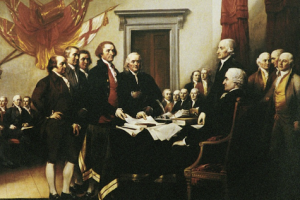During my sophomore year of college, I looked up the entry in a theological dictionary on “angelology.” It suggested that we know very little about angels, and that the best places to get acquainted with the theology of angels were Augustine’s City of God, Anselm’s Why God Became Man, and select writings from Pseudo-Dionysius. That turned out to be massively unhelpful, because my confusion about angels began from having read those three authors that year.
Last week, the Revised Common Lectionary prompted our church to read the conversation between Jesus and the Sadducees in Luke 20:27-38, during which Jesus makes this cryptic comment about those who belong to the age to come:
They are like the angels.
In popular spirituality, people will point to innocence and purity as angelic traits, especially with their loved ones who have passed away: “She was such an angel. She’s looking down on us now.”
Although I have found that language flimsy and unwilling to address real Christian hopes like “the resurrection of the body and the life of the world to come,” I have to ask myself, Why does Jesus think that ‘sons of God, being sons of the resurrection’ are ‘like the angels?’ What could we meaningfully say about angels that would let us love these words of Jesus? In my study, I flipped through Luke’s gospel and considered every text in which he mentions angels, and I was surprised to discover what I did.
What follows will be a brief survey of Luke’s “angelology” that will shed (angelic) light on Jesus’ words in Luke 20:36.
Angels in Luke
The first angel we encounter announces to Mary that her son will be named Jesus, and then explains who he will be: “He will be great and will be called the Son of the Most High. And the Lord God will give to him the throne of his father David, and he will reign over the house of Jacob forever, and of his kingdom there will be no end.” (1:32-33) Before Mary puts the pieces together for herself in the Magnificat, the angel is the one who points to Jesus as the fulfillment of all messianic prophecy.
And lest Israel forget this part of the messiah’s vocation, an angel comes back with a bunch of other angels to announce his ministry to the gentiles: “Behold, I bring you good news of great joy that will be for all the people. for unto you is born this day in the city of David a Savior who is Christ the Lord,” and they said together “Glory to God in the highest, and on earth peace among those with whom he is pleased!” (2:10-11, 14) When the shepherds leave the scene, they “made known the saying that had been told them concerning this child.” At this point, the angels know and understand the gospel better than anyone.
When the devil tempts Jesus in the wilderness, he also evokes the angels: “God will command his angels concerning you, to guard you,” and this directly following his offer of all earthly kingdoms. (4:6-7, 10) The devil also sees a connection between Jesus’ kingship and the support of the angels, although he twists it.
Halfway through Luke’s gospel, and a significant ways into his teaching and healing ministry, Jesus says that “everyone who acknowledges me before men, the Son of Man also will acknowledge before the angels of God, but the one who denies me before men will be denied before the angels of God.” (12:8-9) The phrase “they are like the angels” connotes a sense of being peers, or being in the same league. Sons of the resurrection get along with, are on the same page as, and are somehow constitutionally similar to the angels. The vocation of the angels in Luke, so far, has been simply this: to acknowledge Jesus. It fits, then, to say that if humans likewise acknowledge Jesus, Jesus would acknowledge them before the angels, welcoming us, as it were, into some heavenly family.
And what does this heavenly family do? Jesus makes one suggestion in one of his series’ of parables. “Just so, I tell you, there will be more joy in heaven over one sinner who repents than over ninety-nine righteous persons who need no repentance,” and “Just so, I tell you, there is joy before the angels of God over one sinner who repents.” (15:7, 10) Angels rejoice at God’s salvation of the lost, a central feature of Jesus’ kingship. Those humans who belong to the coming of Jesus’ kingship, who “are like the angels,” likewise rejoice at the repentance of sinners.
The last reference to angels in Luke comes from the women who had seen visions of angels who had told them that Jesus was alive. (24:23) Just as the angels had announced the opening of the gospel to a woman, they announced its conclusion to several more women.
Political Division and Friendship
The English word “angel” comes from the Greek angellos, meaning “messenger.” Luke’s gospel continues into its second book, “The Acts of the Apostles,” in which human messengers continue to announce the gospel to the whole world. The line becomes somewhat blurred. In a literal sense, these Christians are angelloi, God’s messengers sent to announce the good news, peace, and joy of God to a world living in darkness.
As a final word, and a point of my own curiosity, I want to point back to Luke 20:27-38, which is a conversation about marriage in heaven. Jesus says that the people who belong to the age to come neither marry nor are given in marriage. What does he mean? I don’t know, but I’ll share my hunch:
A lot of my thinking and prayer space is taken up by ambiguity and concerns in my relationships. “Whose wife will the woman be?” Interestingly, rather that pointing away from marriage and toward friendships, he points away from marriage and toward angelhood.
Sure, I have questions like “I’m dating. Will we be married one day?” But I also have questions like, “I’m living with four great guys. When our lease and my work contracts are up this July, and I don’t know where we’ll be living, who will my friends be? It was so painful to move away from my friends last year… will I have to do it again?”
Questions like that tempt me to grasp after my relationships, focusing with tunnel vision on the people I don’t want to lose. But there is so much more going on outside of me and my relationships this week. Women, people of color, members of sexual minority groups are getting harassed and a number of them are afraid of going outdoors. Other groups are protesting loudly, violently, and seemingly without any respect for their government. “Division” is the word, and we’re not sure how to pursue healing as a country in November of 2016.
The Sadducees inquire about marriage in the coming age. The angels inquire about salvation in the coming age.
I’m suspicious that trusting God with our relationships, and turning to pray for and welcome the outsiders is a good course of action this month. What if you cancelled one lunch with a friend and scheduled another lunch with a stranger instead? I get that idea from this other passage in Luke:
When you give a dinner or a banquet, do not invite your friends or your brothers or your relatives or rich neighbors, lest they also invite you in return and you be repaid. But when you give a feast, invite the poor, the crippled, the lame, the blind, and you will be blessed, because they cannot repay you. For you will be repaid at the resurrection of the just. (14:12b-14)
I’m afraid that the way many of us pursue friendship has the potential to keep us from doing the work of making “peace on earth.”
(Stay tuned for an upcoming post on a different kind of friendship that has the potential to bring healing in a divided political community.)





Leave a Reply
Your email is safe with us.